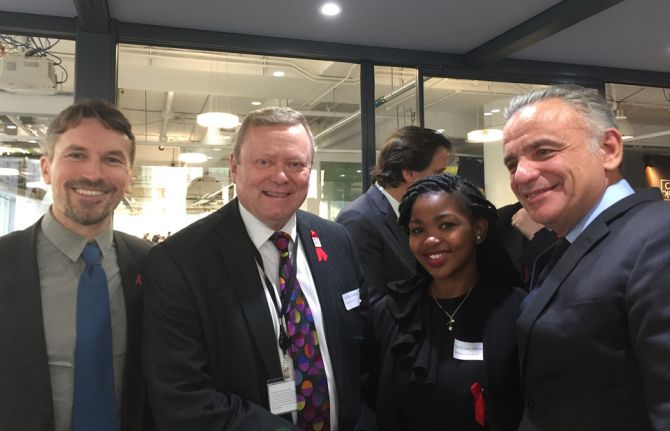

Update
Refuelling the global HIV response: the role of the United Kingdom
30 November 2016
30 November 2016 30 November 2016On the eve of World AIDS Day, STOPAIDS, with support from the United Kingdom All-Party Parliamentary Group on HIV & AIDS, organized an event to discuss the role of the United Kingdom in the global AIDS response.
The participants discussed the role that the leadership of the United Kingdom, one of the largest donors to the international response to HIV, can play in keeping the response on the right trajectory to realize the UNAIDS Fast-Track Targets and ultimately end AIDS as a public health threat by 2030.
Opening the event, Lord Bates, Minister of State at the Department for International Development, took stock of the United Kingdom’s contribution to the global AIDS response to date and the steps the country needs to take to end the AIDS epidemic by 2030.
The participants stressed the need for greater focus and support for key populations at higher risk of HIV infection, ensuring that no one is left behind. Improving access to services for all people, harnessing technology and innovation to scale up and extend services and putting people at the centre by moving towards more integrated services were some of the key areas identified to take the response forward.
UNAIDS emphasized the need for continued political and financial commitment, and stressed that although significant progress has been made in the AIDS response, there is still a financial gap of US$ 6 billion that urgently needs to be addressed.
UNAIDS Deputy Executive Director Luiz Loures, Lord Collins, Shadow International Development Spokesperson in the House of Lords, Anne Aslett, Executive Director of the Elton John AIDS Foundation, and Ndaba Mandela, founder of the Africa Rising Foundation and Mandela Project, were among the participants.
Quotes
“We know what is at stake—we invest our resources now, or we risk facing a resurgence of an epidemic that will take a human societal and financial toll that none of us can possibly bear. It is that simple.”
“We are going to lose the gains we have achieved so far unless we continue to scale up funding and reach people.”
Region/country
Related
 Government ensures continuity of treatment in Malawi
Government ensures continuity of treatment in Malawi

10 February 2025


